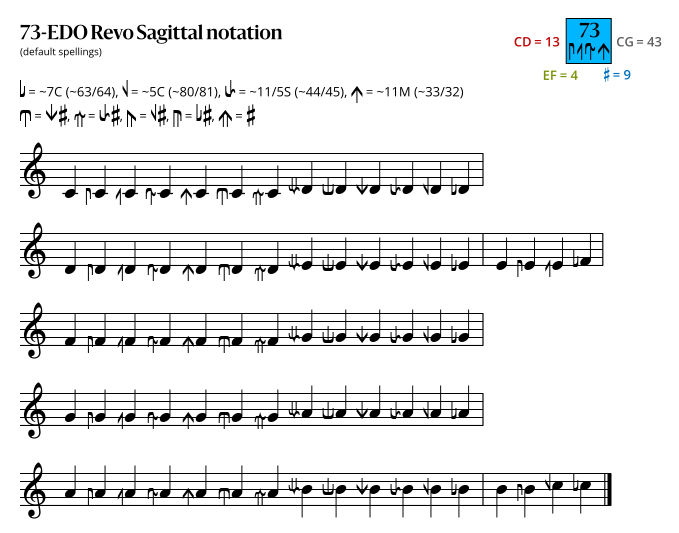73edo
| ← 72edo | 73edo | 74edo → |
73 equal divisions of the octave (abbreviated 73edo or 73ed2), also called 73-tone equal temperament (73tet) or 73 equal temperament (73et) when viewed under a regular temperament perspective, is the tuning system that divides the octave into 73 equal parts of about 16.4 ¢ each. Each step represents a frequency ratio of 21/73, or the 73rd root of 2.
Theory
73edo has a very sharp tendency, with the approximations of 3, 5, 7, 11 all sharp. The equal temperament tempers out 78732/78125 and 262144/253125 in the 5-limit; 126/125 and 245/243 in the 7-limit; 176/175, 441/440 and 4000/3993 in the 11-limit; 91/90, 169/168, 196/195, 325/324, 351/350, and 352/351 in the 13-limit. It provides the optimal patent val for the marrakesh temperament, though 104edo and 135edo tunes it better.
73edo can be used as a tuning of trismegistus or mavila, by the 9:5 relation in the superdiatonic scheme, though neither of these use the most accurate 3/2.
Prime harmonics
| Harmonic | 2 | 3 | 5 | 7 | 11 | 13 | 17 | 19 | 23 | 29 | 31 | |
|---|---|---|---|---|---|---|---|---|---|---|---|---|
| Error | Absolute (¢) | +0.00 | +4.89 | +8.21 | +1.04 | +7.59 | -2.17 | -6.33 | -1.62 | -3.62 | +6.04 | +5.65 |
| Relative (%) | +0.0 | +29.8 | +49.9 | +6.3 | +46.1 | -13.2 | -38.5 | -9.9 | -22.0 | +36.7 | +34.4 | |
| Steps (reduced) |
73 (0) |
116 (43) |
170 (24) |
205 (59) |
253 (34) |
270 (51) |
298 (6) |
310 (18) |
330 (38) |
355 (63) |
362 (70) | |
Subsets and supersets
73edo is the 21st prime edo, past 71edo and before 79edo.
Intervals
| Steps | Cents | Approximate ratios | Ups and downs notation |
|---|---|---|---|
| 0 | 0 | 1/1 | D |
| 1 | 16.4 | ^D, v3E♭ | |
| 2 | 32.9 | ^^D, vvE♭ | |
| 3 | 49.3 | 36/35, 38/37 | ^3D, vE♭ |
| 4 | 65.8 | ^4D, E♭ | |
| 5 | 82.2 | 21/20, 22/21 | v4D♯, ^E♭ |
| 6 | 98.6 | 35/33 | v3D♯, ^^E♭ |
| 7 | 115.1 | 31/29 | vvD♯, ^3E♭ |
| 8 | 131.5 | 14/13, 27/25 | vD♯, ^4E♭ |
| 9 | 147.9 | 12/11, 37/34 | D♯, v4E |
| 10 | 164.4 | 11/10 | ^D♯, v3E |
| 11 | 180.8 | 10/9 | ^^D♯, vvE |
| 12 | 197.3 | ^3D♯, vE | |
| 13 | 213.7 | 26/23 | E |
| 14 | 230.1 | 8/7 | ^E, v3F |
| 15 | 246.6 | ^^E, vvF | |
| 16 | 263 | ^3E, vF | |
| 17 | 279.5 | F | |
| 18 | 295.9 | 19/16 | ^F, v3G♭ |
| 19 | 312.3 | 6/5 | ^^F, vvG♭ |
| 20 | 328.8 | 23/19, 29/24, 35/29 | ^3F, vG♭ |
| 21 | 345.2 | 11/9 | ^4F, G♭ |
| 22 | 361.6 | 16/13 | v4F♯, ^G♭ |
| 23 | 378.1 | v3F♯, ^^G♭ | |
| 24 | 394.5 | vvF♯, ^3G♭ | |
| 25 | 411 | vF♯, ^4G♭ | |
| 26 | 427.4 | F♯, v4G | |
| 27 | 443.8 | 31/24 | ^F♯, v3G |
| 28 | 460.3 | ^^F♯, vvG | |
| 29 | 476.7 | 29/22 | ^3F♯, vG |
| 30 | 493.2 | G | |
| 31 | 509.6 | ^G, v3A♭ | |
| 32 | 526 | 19/14, 23/17 | ^^G, vvA♭ |
| 33 | 542.5 | 26/19 | ^3G, vA♭ |
| 34 | 558.9 | 29/21 | ^4G, A♭ |
| 35 | 575.3 | v4G♯, ^A♭ | |
| 36 | 591.8 | 31/22 | v3G♯, ^^A♭ |
| 37 | 608.2 | 37/26 | vvG♯, ^3A♭ |
| 38 | 624.7 | vG♯, ^4A♭ | |
| 39 | 641.1 | 29/20 | G♯, v4A |
| 40 | 657.5 | 19/13 | ^G♯, v3A |
| 41 | 674 | 28/19, 31/21, 34/23 | ^^G♯, vvA |
| 42 | 690.4 | ^3G♯, vA | |
| 43 | 706.8 | A | |
| 44 | 723.3 | ^A, v3B♭ | |
| 45 | 739.7 | ^^A, vvB♭ | |
| 46 | 756.2 | 31/20 | ^3A, vB♭ |
| 47 | 772.6 | ^4A, B♭ | |
| 48 | 789 | v4A♯, ^B♭ | |
| 49 | 805.5 | 35/22 | v3A♯, ^^B♭ |
| 50 | 821.9 | 37/23 | vvA♯, ^3B♭ |
| 51 | 838.4 | 13/8 | vA♯, ^4B♭ |
| 52 | 854.8 | 18/11 | A♯, v4B |
| 53 | 871.2 | 38/23 | ^A♯, v3B |
| 54 | 887.7 | 5/3 | ^^A♯, vvB |
| 55 | 904.1 | 32/19 | ^3A♯, vB |
| 56 | 920.5 | B | |
| 57 | 937 | ^B, v3C | |
| 58 | 953.4 | ^^B, vvC | |
| 59 | 969.9 | 7/4 | ^3B, vC |
| 60 | 986.3 | 23/13 | C |
| 61 | 1002.7 | ^C, v3D♭ | |
| 62 | 1019.2 | 9/5 | ^^C, vvD♭ |
| 63 | 1035.6 | 20/11 | ^3C, vD♭ |
| 64 | 1052.1 | 11/6 | ^4C, D♭ |
| 65 | 1068.5 | 13/7 | v4C♯, ^D♭ |
| 66 | 1084.9 | v3C♯, ^^D♭ | |
| 67 | 1101.4 | vvC♯, ^3D♭ | |
| 68 | 1117.8 | 21/11 | vC♯, ^4D♭ |
| 69 | 1134.2 | C♯, v4D | |
| 70 | 1150.7 | 35/18, 37/19 | ^C♯, v3D |
| 71 | 1167.1 | ^^C♯, vvD | |
| 72 | 1183.6 | ^3C♯, vD | |
| 73 | 1200 | 2/1 | D |
Notation
Sagittal notation
This notation uses the same sagittal sequence as 80-EDO.
Evo flavor

Revo flavor

Scales
- Porky[7]: 10 10 10 13 10 10 10 ((10, 20, 30, 43, 53, 63, 73)\73)
Instruments
A Lumatone mapping for 73edo is available.